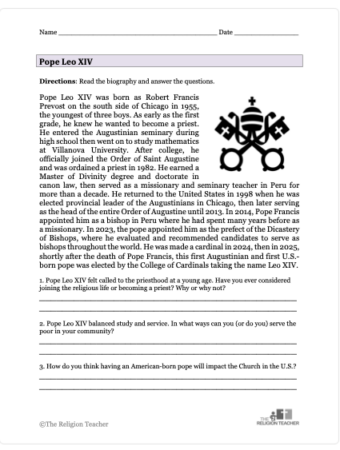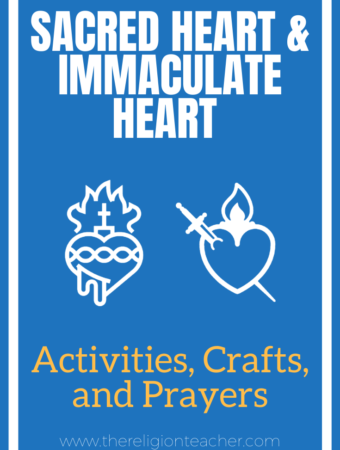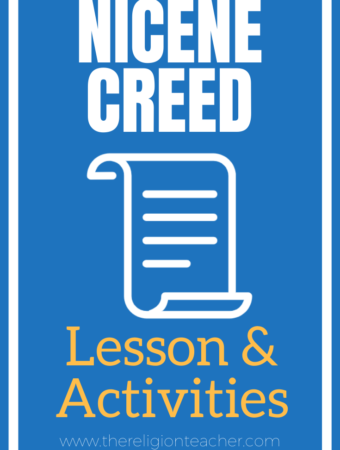Occasionally you will have the opportunity to meet with students either before or after mass. As I mentioned in my post on CatholicMom.com, “How to Get Teens to Participate in Mass,” it is critical that we help young people connect their personal experiences with the Liturgy (“find their feelings”) and learn more about the God they encounter in the Eucharist (“teach them why”). Consider using the following reflection questions for school Mass, religious education Masses, or before and after Sunday Masses. Keep in mind that the more you ask these questions (even if they have no answers at first), the more your students will think of them during the Liturgy. Remember that in addition to challenging young people to be reflective during Mass, you are also building strong habits that will last a lifetime.
Pre-Mass Reflection and Discussion Questions
 Consider first taking an inductive approach to liturgical catechesis (NDC, 29) that focuses on the young person’s experiences before, during, and after the encounter with God in the Liturgy.
Consider first taking an inductive approach to liturgical catechesis (NDC, 29) that focuses on the young person’s experiences before, during, and after the encounter with God in the Liturgy.
- What are the 2-3 things that are dominating your attention and thought today? What can you ask of God in the Liturgy to address these things?
- Has God been at work in your daily life? What evidence is there that God is communicating with you daily? How do you expect this communication to continue during the Liturgy?
Read any or all of the day’s Scripture passages in the Liturgy of the Word. Take students through a process of lectio divina by asking them some of these questions:
- What word or phrase jumps out at you in today’s reading?
- Imagine yourself being a present during this story. What do you see, hear, smell, taste, feel, etc.? Describe everything in detail.
- Imagine that you are one of the people in the reading. What do you feel, think, and do as a response to the events?
- What does this reading remind you of in your life at this particular moment?
The Mass is in an opportunity to receive forgiveness of venial sins. Take the students through an Examination of Conscience, if possible.
- When have you failed to love yourself, God, and neighbor?
- Are there people who you have hurt in some way by your words, actions, or failure to act?
- What personal weaknesses can God take over for you today?
The word eucharist means “thanksgiving.” As a celebration of thanksgiving, pose the following questions regarding the Mass:
- What are you most thankful for today?
- Who are you thankful is in your life today?
- What has God done for you in your lifetime that you can thank him for today?
Post-Mass Reflection and Discussion Questions
Questions related to personal experience:
- What is God prompting you to do in your encounter with him in the Sacrament?
- What experiences during the Mass did you find most relevant to your current situation and life?
- What was the holiest experience you had during Mass?
Reflections on the Liturgy of the Word:
- What word or phrase jumped out at you in today’s reading?
- Imagine that you were present during this story. What do you see, hear, smell, taste, feel, etc.? Describe everything in detail.
- Imagine that you are one of the people in the reading. What do you feel, think, do as a response to the events?
- What did this reading remind you of in your life at this particular moment?
Forgiveness:
- Are there specific experiences of forgiveness that you have taken away from today’s Liturgy?
- What habits should you form to avoid sin in the future?
Eucharist as thanksgiving:
- What did you or can you be thankful for after today’s Liturgy?
- Is there anything for which you will make a commitment to be thankful for today?
The name Mass comes from the Latin missa, which means to “go forth” and is taken from the final words of the concluding rite.
- How will you bring Christ to the world today?
- What will you do to show God’s love to others?
- What are the greatest needs that you see in your everyday life? Empowered with the love of God in the Eucharist, what will you do to help meet those needs?
If you would like to download a complete copy all all these questions without the prompts, you can download them in either black & white or with a blue background.
Catholic Mass Meditation Worksheets
If y0u would like to guide your students through a series of meditations on the parts and prayers of the Mass, check out The Religion Teacher’s Catholic Mass Worksheets, which includes 18 printable handouts to help students understand and reflect on the liturgy.



Your article interests me. Thank you for sharing it. In brief, it is important to observe the priests who hold fundamental role in the Liturgy. From my inquiries among the youngsters (age 14 – 16 yrs) whom I work with, they expressed having difficulties with the homilies. They don't understand what the celebrant preaches. Not every parish think of having a mass specially for youths and priests reach out to them through mass.Their experiences should take place within the liturgical celebration essentially, as we address the issues in class discussions. Often, it is left to those who work exclusively with the youths to explain and enlighten them. It is obvious sometimes, assimilating the Liturgy to a festive season that "the table is full (with food, drinks and presents) but hearts are empty." It seems meaningful to explore the Scripture than it is appropriate to extract from the homilies. I question my students with Scriptural reflections.
Teaching the kids a fundamental understanding of the Mass is critical.
Thanks for a great post that I have forwarded to other religion teachers at our school and that I will definitely use in the classroom this upcoming year. There is so much richness of tradition and Sacramental mystery in the Mass. Unfortunately much of it is often is left "unconsumed." Your questions prompt the development of faith and the collection of blessings God died to offer all of us. I am grateful for the work you do that helps me be a better Christian, Catholic and teacher. Sincerely,
Allison Welch
cjneng1 – You are absolutely right. The priest is integral to all parish and school life. He is in persona Christi in both the proclamation of the Word and the celebration of the Eucharist. Working with the pastor/priest to improve school masses is very important. In the meantime, I hope these questions will be useful.
Allison – thanks for sharing this!
From "Anonymous":
What is the role of weekly Mass in the core curriculum of the Catholic school?
Good morning, I am beginning my 3rd year as a middle school religion teacher. Some of my colleagues have voiced their opinion that our weekly Mass is infringing upon, wasting, precious time that they could be using to teach their core subjects. I am not sure how to respond to this, mostly because I am incensed that they believe their core subjects are more important than having children attend Mass.
So far I have remained silent, but I feel a tempest growing in my gut. I have prayed regularly for guidence but still do not know what to do or how to answer their criticisms. I have to say that I find this all very ironic since we are a Catholic school and therefore should do what we can to promote a Catholic way of life.
Any guidence you can provide will be greatly appreciated.
YBIC,
MOS
MOS,
I can relate to your frustration. For some reason, teachers easily forget that they are in a Catholic school. It is up to your administration to make this clear to the faculty. I would, first, explain this frustration to your principal.
As for your response, I might explain to these teachers the essential learning that goes on at Mass. The Church deeply believes in the maxim "lex orandi, lex credendi" which means the way we worship (orandi) is primary and informs what we believe (credendi). The Mass is THE core subject of a student in a Catholic school. It is not a waste of time.
Wow, I really like the premise of pre and post discussions. I bet it really helps to focus the kids on what’s going on beforehand and then to “debrief” the experience afterwards. I like the idea of lecito divina in preparation. That reflection would allow the Holy Spirit to drive home the lesson of the readings during the Mass. And, the post-Mass discussion is sort of like a “mystagogy.”
Unfortunately, MOS, I’ve seen the same attitude in the Catholic school with regard to Mass and even at times the religion curriculum itself being played down in favor of the core subjects. I believe it is vitally important to maintain a weekly Mass during school hours to reinforce the traditions and practices of the Faith. Adoration at some point during the week is an excellent practice as well.
I think these questions really invite youth leaders to proclaim the Gospel to the youth they work with while centering that within the experience of the Church. Thanks for sharing!
Your welcome practicinghuman, I hope you’ll find these beneficial in your ministry as well.
Hey, Jared – I just happened upon this post, and I love the structure you’ve given us for introducing our students to a deeper understanding and appreciation of the Mass. I have to second anything that was said about the struggle to keep the Eucharist – “source and summit” of our faith – at the center of Catholic education. And I TOTALLY agree that, if it’s not coming from the administration, it’s very difficult to nurture the Catholic identity of a school.
Hello,
I would like to put a question that has long puzzled me. Why did God abandon John the Baptist?
Thanks.
Osborne, I’m not sure exactly what you mean. In what way did God abandon John the Baptist?
Thank you so much for the post. I am using this information as a parent who wants to keep her children actively involved in the faith. My opinion regarding the colleagues who think Mass is a waste of time is, it is ok to speak the truth in love. I would picture Jesus doing the same thing. I also think of the works of mercy which include admonishing sinners. I was a teacher in a public school for 15 years and there are so many pressures being put on teachers which have nothing to do with what is best for children. Maybe this is an example of the culture infiltrating the faith community. Also, there are so many competing demands on teachers that it becomes difficult to focus on what is most important. Maybe your colleagues just need a gentle reminder.